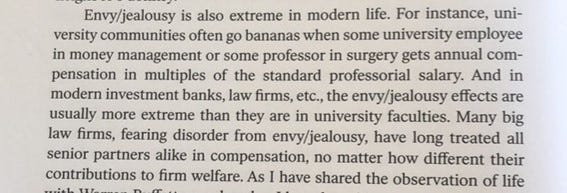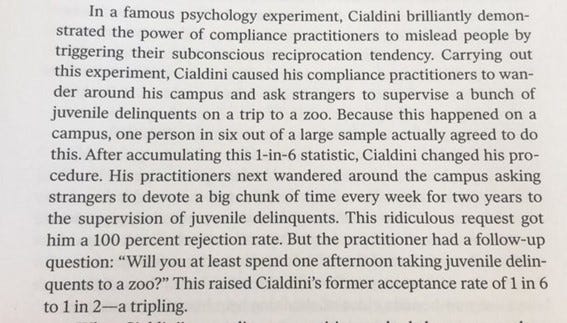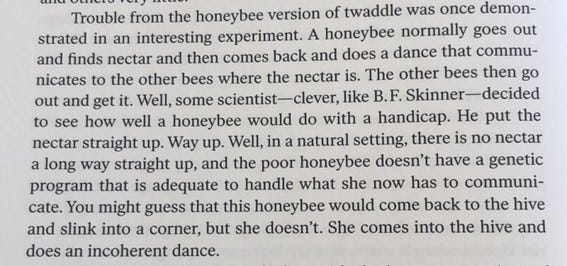Poor Charlie’s Almanack contains several speeches Charlie Munger gave. Absolutely all of them are delightful. Further, even though some topics are recurrent, it is unusual how much they differ in essence with one another. In today’s article, I want to provide you with a comprehensive overview of Charlie’s most famous speech: The Psychology of Human Misjudgment.
Given in 1995 at Harvard University, Charlie articulated several elements he noticed cloud our judgment. What’s magnificent about Munger’s work is that The Psychology of Human Misjudgment was conceived by his intellect long before such themes became carefully studied.
On one occasion, he mentioned the dissatisfaction he felt when he realized how scattered psychology discoveries are across textbooks. In an attempt to fulfill a large hole this discipline has, Munger put together this speech. Furthermore, Charlie’s affiliation with the pursuit of truth and lack of interest in being likable led him to share what he found in dark territories. Those which academic psychology ignore due to their “immorality” or political roots.
1. Reward – and punishment – superresponse tendency
Charlie included this as his first unit of analysis because he claims that almost everyone underestimate the power of incentives. We, as humans, and extensible to living intelligent beings, are wired to repeat behavior that generates a reward. Similarly, punishment is deeply undesired, and hence causes us to avoid certain things. It therefore becomes a manager’s core task to get incentives right in a business for it to function appropriately.
2. Liking/loving tendency
Humans are genetically designed for seeking others’ love and admiration. “One very practical consequence of liking/loving tendency is that it acts as a conditioning device that makes the liker or lover tend to:
Ignore the faults of, and comply with the wishes of, the object of his affection.
Favor people, products, and actions merely associated with the object of his affection.
Distort other facts to facilitate love.”
3. Disliking/hating tendency
Alike the prior cause of misjudgment, our brain is configured for us to be repelled by elements of dislike. This makes us (extract):
Ignore virtues in the object of dislike.
Dislike things associated with the object of dislike.
Distort others to facilitate hatred.
4. Doubt-avoidance tendency
We cannot live with uncertainty, but life is full of it. Every step we take dramatically increases the number of clouds we are capable of seeing. To fill these inevitable gaps and not lose sanity, the mind arrives at conclusions on a detrimentally rapid fashion. Charlie recognizes the usual trigger of this tendency as a mix of puzzlement and stress. To partially counteract its effects, carefully analyzing the other posture’s arguments and delaying decisions might help.
5. Inconsistency-avoidance tendency
Similar to avoiding doubt, it is unproductive for our brain to revise prior conclusions it has reached. We are therefore incredibly reluctant to change, in all senses. It pushes us outside of what we seem to know, causing our mind to perceive danger from such a place, as there’s no roadmap for action. From a broad perspective, this might have yielded positive results as it allows huge, aggregated energy savings, which can be destined towards productive ends. In his speech, Charlie speculated on why was this programmed and reached three hypotheses:
It facilitated faster decisions when speed of decision was an important contribution to the survival of nonhuman ancestors that were prey.
It facilitated the survival advantage that our ancestors gained by cooperating in groups, which would have been more difficult to do if everyone was always changing responses.
It was the best form of solution that evolution could get to in the limited number of generations between the start of literacy and today’s complex modern life
6. Curiosity tendency
In line with our doubt-avoidance tendency, human civilization has always tried to push knowledge frontiers forward. This led the Greeks to develop huge deals of math and science. As there is no economic reward in many of the endeavors that curiosity fuels, it might be reasonable to conjecture we are prone to this.
7. Kantian fairness tendency
In contrast to the average ancestor, the modern man displays a lot of fairness and expects the same from others. Charlie speaks about a curious scenario that repeats itself across territories.
8. Envy/jealousy tendency
One has to not look further than their own environment to notice displays of both sentiments. In fact, Warren stated that “it is not greed that drives the world but envy”, a line to which Charlie used to refer with great admiration.
9. Reciprocation tendency
Cialdini identified one of the most powerful drivers of human behavior, the reciprocation tendency. We are subconsciously forced to reciprocate good and bad actions inflicted upon us. Furthermore, when a human gets the sense of having rejected something it was offered to them, they are then more prone to accept the next offering. Charlie included in his speech an experiment carried out by Robert Cialdini.
10. Influence-from-mere-association tendency
We tend to make decisions whose output we associate with past-rewarded behavior or things we like, being the inverse also true. The effects this tendency causes are innumerable:
Our past experiences might suggest that the highest-priced item is always the one of the highest quality. Businessmen can leverage this knowledge to drive up profit by subconsciously making customers believe their product is the finest.
Advertisers have long known this trait, which has made them utilize ads by displaying a product alongside a thing of our liking.
Past success recurrently leads to thinking that it is repeatable. This pattern causes a person that had luck one time in the casino to repeat the experience, attributing success to his own skill.
In line with the hating/loving tendency, people in business tend to under-appraise others’ good traits, if they dislike them.
Carrying bad news is dangerous. It makes the recipient associate the messenger with the message itself and hence hate the person.
11. Simple, pain-avoiding psychological denial
Logically, our body despises pain and everything that resembles to it. Moreover, it repudiates it in whichever form it comes, either physical or psychological. To avoid feeling and falling in such state, the mind distorts reality, adapting it to what it thinks won’t inflict pain. Munger firstly came to this conclusion after observing a mother after World War II.
12. Excessive self-regard tendency
This one reminds me of the overconfidence bias, which causes us to overestimate our skills. Charlie’s version, however, is more general. He says we tend to over-appraise our possessions as well as our abilities. The effect is so powerful that “all man’s decisions are suddenly regarded by him as better than would have been the case just before he made them”
13. Overoptimism tendency
Demosthenes said, “What a man wishes, that also will he believe”. In some sense, Munger gets this is one Man’s display of an excess of optimism. We are very much prone to believing in outcomes we wish, which are—not coincidentally— thought of by stretching optimism to its limits.
14. Deprival-superreaction tendency
Losses hurt disproportionately more than wins generate pleasure, which can be linked to Cialdini’s idea that wins are better to be gotten slowly, while the way to mitigate losses’ pain is to suffer them on a one-time basis. This causes individuals to overreact when deprived of something previously in their possession. In his speech, Charlie utilized the example of one of his family’s dogs.
15. Social-proof tendency
Humans have longly lived to follow crowds. In our early innings, we learn by imitation, which causes an everlasting overappraisal of our peers’ opinions. There always appears to be rationality and common sense under consensus’ conclusions and decisions. We are therefore prone to replicating nearby behavior.
16. Contrast-misreaction tendency
Because our nervous system is not done for measuring things in absolute scientific terms, we simplify. That’s what makes us contrast new things with old ones, which we seem to have already digested. And this contrast tendency mostly impedes humans from cognitively detecting trends and changes. In some sense, our brain is configured, or capable, of only spotting abrupt changes.
17. Stress-influence tendency
When experiencing stress, reactions are exacerbated. The adrenaline our bodies are filled with prompts us to make faster and more rapid decisions, which is the reason why I believe to have read that a fair amount of stress is useful for achieving optimal performance. Moreover, instances of heavy stress might lead to strong changes in behavior. The latter insight derived from an experiment a Russian psychology researcher carried out with dogs.
18. Availability-misweighing tendency
We adjust ourselves to the information available, logically. Consequently, our mind overweights the facts we count with. Because we cannot see the whole board, but we need to assign a theoretical 100% of relevance, we tend to distribute it among pieces that are known by us. Therefore, a most likely irrelevant piece of the puzzle might be receiving a disproportionate amount of perceived importance.
“When I’m not near the girl I love, I love the girl I’m near”
19. Use-it-or-lose-it tendency
Most likely experienced by all of us, we lose those skills we don’t frequently practice. Similarly, knowledge acquired can be hardly consciously consulted if not routinely refreshed.
20. Drug-misinfluence tendency
“This tendency’s destructive power is so widely known to be intense, with frequent tragic consequences for cognition and the outcome of life, that it needs no discussion here to supplement that previously given under “simple, pain-avoiding psychological denial”.
21. Senescence-misinfluence tendency
Aging brings with it a natural cognitive decay, which makes learning complex and new skills much harder.
22. Authority-misinfluence tendency
Life is, in general, built in hierarchies. Living beings, like us, are therefore prone to follow leaders and overweight their decisions. This can lead to stupid decisions, even if one could easily foresee their stupid nature when reasonably analyzed.
23. Twaddle tendency
Humans try to find an explanation to things, even when that implies reaching unconventional or illogical ones. It is in fact so strong our desire that, in the absence of a mechanism that could help us illustrate a phenomenon, we improvise, even if the improvisation is an inaccurate and false representation of the item we seek to manifest ourselves about.
24. Reason-respecting tendency
Helped by the doubt-avoidance tendency, humans give immense value to rationality. We respect accurate cognition and experience joy in its exercise. Therefore, we are more likely to learn and do things well if the reasons in favor of its doing are stated. In this line, Charlie always shared an anecdote from a businessman.
25. Lollapalooza tendency
Charlie explicitly stated he was shocked to see this phenomenon was not included in any psychology textbook nor was it possible to find anywhere. The lollapalooza effect dominates life, according to his view. This is “the tendency to get extreme consequences from confluences of psychological tendencies acting in favor of a particular outcome”.
Taking it further and utilizing it for an example, Munger wrote another speech in which he solves a practical problem he himself posts: how can someone turn 2M startup capital into 2 trillion dollars. It is curious how Charlie leverages multiple psychological notions which, given time, generate immensely powerful effects over the general population.
The date in which he posits the problem to be situated is 1880 and the answer is Coca Cola. Charlie displays all of the tendencies working in favor of Coke remaining standing, taking a large portion of the market and having high degrees of pricing power.
Personal Commentary
I said it before, but the more I get to meditate on this matter, the more I think that Poor Charlie’s Almanack has changed my life and view of things. What a bright and clear-minded intellectual. As investors, and humans as well, we need to be vividly aware of these innate traits we carry. Hope you enjoyed the article!
Contact: Giulianomana@0to1stockmarket.com















Thanks Giuliano, was eagerly awaiting this one !